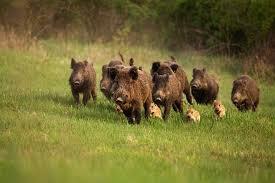 Tönnies, he largest pork producer in Germany with approximately one third of the domestic market is closing an export packaging section in a plant in Weisenfels in the state of Saxony-Anhalt. Approximately 140 workers out of a total of 2,200 will be made redundant. The action was taken as a result of import bans imposed on Germany by China and South Korea. The action by China is unjustified, given the fact that African swine fever is endemic in that Nation and recently has increased in incidence. Prior to the September 2020 ban, Germany exported pork and low-value products to Asian nations.
Tönnies, he largest pork producer in Germany with approximately one third of the domestic market is closing an export packaging section in a plant in Weisenfels in the state of Saxony-Anhalt. Approximately 140 workers out of a total of 2,200 will be made redundant. The action was taken as a result of import bans imposed on Germany by China and South Korea. The action by China is unjustified, given the fact that African swine fever is endemic in that Nation and recently has increased in incidence. Prior to the September 2020 ban, Germany exported pork and low-value products to Asian nations.
African swine fever was introduced into Germany by wild boars migrating westward from Poland. Eastern states, centering on Brandenburg with Saxony to the south and Mecklenburg-Vorpommern to the north being most affected. Attempts to exclude boars from Poland by reinforcing border fencing have been largely unsuccessful. Reducing the domestic population in these states by hunting has not been effective, given the adaptability of these animals and their rate of reproduction.

By the same token, the vast wild boar population in the U. S. represents a potential for mass dissemination of African swine fever virus if it enters the U. S. Although a federal program and state initiatives are directed at reducing the wild boar population, the range of these pests and their numbers are increasing. More aggressive measures must be taken to deplete wild boars that represent an ongoing danger to the pork industry.
Measures to prevent introduction of African swine fever continue with surveillance of ports of entry, including airports. The presence of endemic ASF in Haiti and the Dominican Republic represent a risk of introduction by travelers entering through east coast airports carrying uncooked pork products. A greater danger exists on the West Coast with illegal, large-scale smuggling of specialty oriental pork products as undeclared cargo in shipping containers.
Identifying contraband pork in passengers’ luggage at airports will requ ire more extensive deployment of the “beagle brigade” with Congress appropriating additional funds to expand the program as intended by the bipartisan Beagle Brigade Act of 2023 recently introduced into the House and Senate. More deterrence is necessary to prevent illegal importation of pork products from China with surveillance at the retail level and trace back to importers and wholesalers. Penalties for deliberate and commercial-level smuggling should be increased with mandatory prison terms to act as a deterrent. Introduction and spread of ASF would incur costs for control and the escalation in price of pork affecting consumers is highlighted by the ongoing epornitic of Highly Pathogenic Avian Influenza.
ire more extensive deployment of the “beagle brigade” with Congress appropriating additional funds to expand the program as intended by the bipartisan Beagle Brigade Act of 2023 recently introduced into the House and Senate. More deterrence is necessary to prevent illegal importation of pork products from China with surveillance at the retail level and trace back to importers and wholesalers. Penalties for deliberate and commercial-level smuggling should be increased with mandatory prison terms to act as a deterrent. Introduction and spread of ASF would incur costs for control and the escalation in price of pork affecting consumers is highlighted by the ongoing epornitic of Highly Pathogenic Avian Influenza.